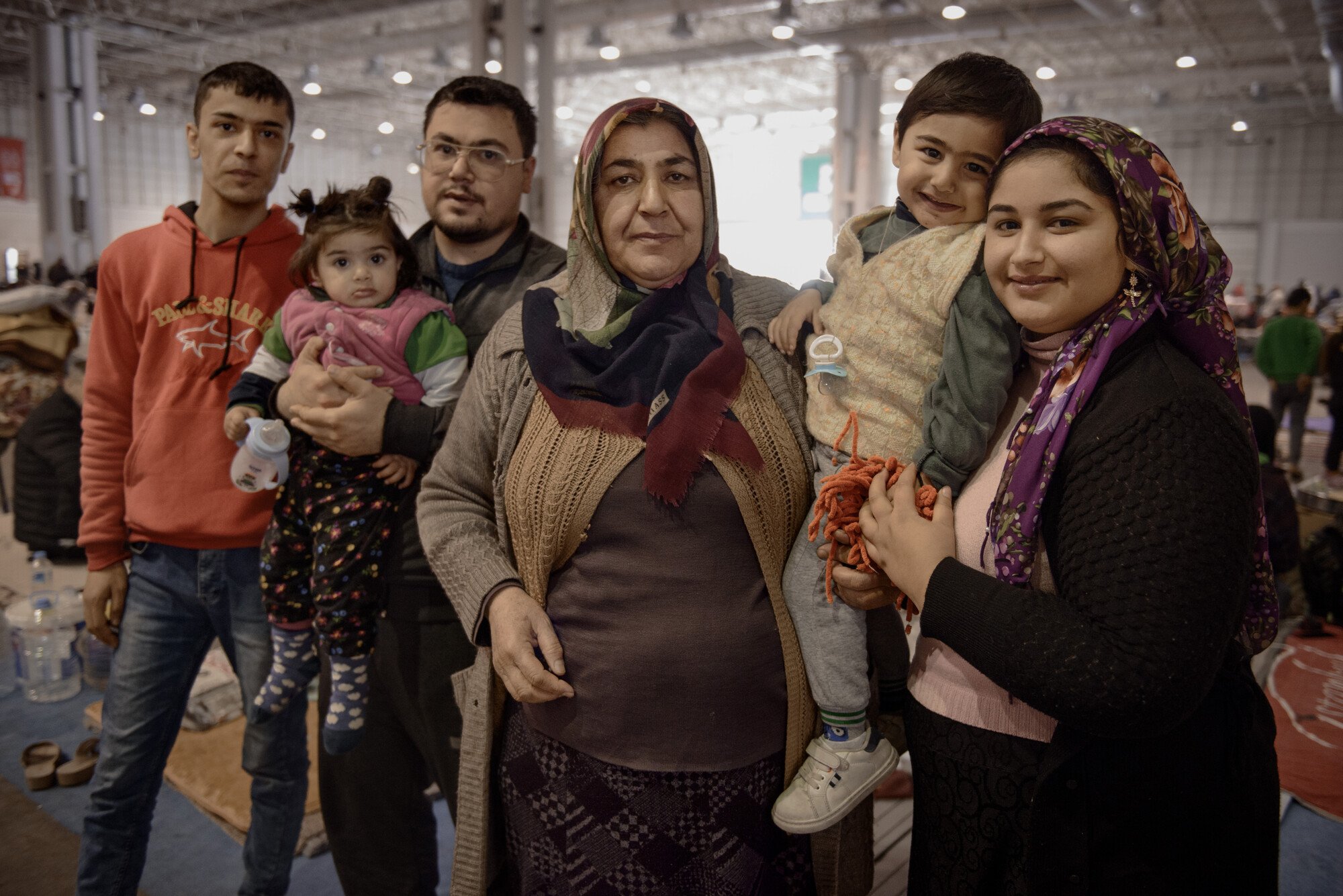With hundreds of thousands of people in need of assistance, Oxfam is rushing clean water and other assistance to people struggling to recover from earthquakes and loss of homes and businesses.
Emine Oguz says she jumped from her bed when the earthquake hit her home in Gaziantep, in southern Türkiye (Turkey) on the 6th of February.
Somehow she and her two sons, daughter in law, and two grandchildren managed to get outside, where they watched everything shake violently for two hours. Eventually, the freezing temperatures outside outweighed the danger in their home, and her elder son dashed inside to quickly grab some blankets. A neighbor suggested they go to the Middle East Exhibition Centre to escape the cold.
After making the long walk to the Centre, they slept on the floor. But at least they were safe, and warm. It is a loud and busy place, but in some parts of it people sit in silence, obviously in grief.
Oguz, 60, has lived through two other earthquakes in her life, but says “this one was different, this one was terrible.” She says when she is sitting down, it feels like her legs are shaking. “My legs don’t work how they used to,” she says between tears.
Oguz and her family are among the 13 million people in southern Türkiye affected by three massive earthquakes, about one million of whom are now living in shelters. Tens of thousands more are injured.

The earthquakes also hit areas of northern Syria affected by conflict for the last 12 years. Syria has already been suffering from an economy crippled by inflation and conflict, with soaring food and fuel prices. About 90 percent of the country lives below the poverty line, and there is a threat of cholera in areas also affected by the earthquake, according to Moutaz Adham, Oxfam’s director in Syria. “Cholera cases, which were already on the rise even before the earthquake, could surge given the scarcity of proper sanitation facilities in overcrowded mosques and temporary camps.”
In the weeks after the first temblors hit on February 6th, officials estimate that nearly 50,000 people have perished.
Rushing aid to survivors
The sheer scale of the disaster is staggering. Oxfam and our partners in Türkiye and Syria are dealing with destroyed roads, damaged gas pipelines and communications networks, and massive distances. The affected area is more than 99,000 square kilometers (39,600 square miles), roughly three times the size of Belgium.
And the affected people include the staff of Oxfam KEDV, the Oxfam affiliate in Türkiye: Münevver Tuvarlak, 35, says she and her husband and two children fled their fourth-floor apartment in Gaziantep after the second large earthquake. “We stayed in the car for about six hours after the earthquake,” she says. “I remember looking at the garden shake and thinking, ‘this shouldn’t happen, gardens don’t shake like this.’”
She and her family are sheltering at Oxfam KEDV’s office, where she and other staff immediately facilitated the provision of food, shelter, blankets and psychological support to some of most affected areas including Gaziantep, Hatay, and Mardin.
For many years, Oxfam KEDV has worked closely with a network of grassroot women-led organizations, and plans to continue this collaboration to reach up to 1.4 million people over the next three years, distributing food, cash, clean water and hygiene items; repairing water and sanitation systems and raising awareness of the threats of deadly diseases; and helping to protect vulnerable women and children from violence.
Volunteers show solidarity
At an industrial park on the outskirts of Gaziantep, Berfin Akdeniz, 18, is at a distribution center, sorting through baby grows (onesies) and nappies (diapers), a reminder of who some of the most vulnerable survivors are. These and other aid items are destined for a local hospital. Outside, a steady stream of cars and vans pull up outside, and the drivers report where aid is needed the most. Snow covers the ground as Turkish soldiers check everyone arriving at the warehouse.

This distribution center is operated jointly by local aid groups, the government aid agency AFAD, and larger aid organizations like Oxfam KEDV. Akdeniz, a recent high school graduate planning to attend university to become a teacher, is volunteering here along with some of her friends. As part of their work to facilitate the delivery of aid to affected people, they check and recheck all the items about to go out the door.
“My family and friends are safe,” Akdeniz says. She is there “to show solidarity” with all those who are more unfortunate. “I am here because I need to be.”
